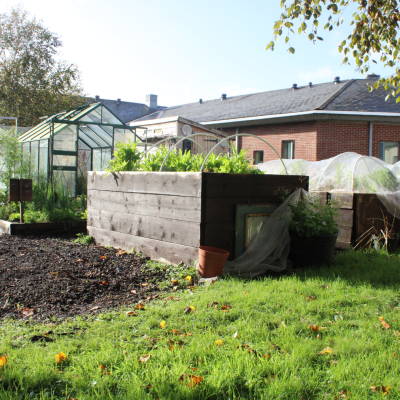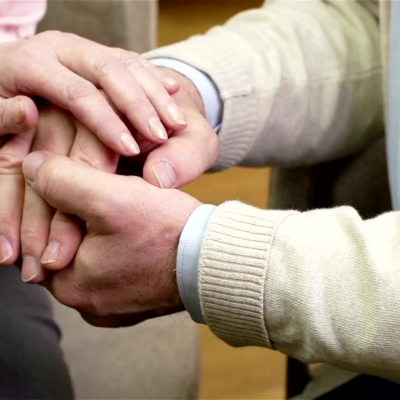Publish date: 5 May 2025
Maternal Mental Health Week: case study
When Becky became a mother in early 2023, it should have been perfect. She had a career, a husband, and life was good. And when Luca arrived it was a natural birth, they bonded immediately, and she was breastfeeding. Everything was going well.
But within nine months of Luca’s birth, Becky was getting intrusive thoughts and was beginning to feel suicidal.
“I didn’t tell anyone for nine months—I just kept it all locked away, convinced there was something seriously wrong with me.”
“Eventually, I built up the courage to tell the perinatal mental health team.” Becky explained. She met with the team from Avon and Wiltshire Mental Health Partnership NHS Trust (AWP) towards the end of 2023, after speaking to her health visitor.
“Instead of judging me, they met me with so much empathy and understanding.”
What had caused her to become so unwell, though? Getting to know your child during the first year of their life should be a wonderous, joyful experience for parents. It’s also a tiring and emotionally draining experience, too, that can have a huge effect on the parents’ mental health.
When Becky’s husband went back to work after two weeks, the role of full-time mother began to take its toll.
“The transition from woman to mother was one of the biggest, most confusing changes I’ve ever been through. I felt like I lost myself overnight.” Becky explained. “No more just heading out for a walk, eating when I was hungry, or even going to the toilet when I needed to. All the things I used to enjoy—the gym, the cinema, my favourite café—suddenly felt totally out of reach. And work was gone. I became a vessel, completely consumed by this tiny person I loved more than anything… but who also completely changed everything.”
With this huge change in their lives, it’s perhaps unsurprising that 1 in 5 women experience a perinatal mental health problem.
“For me, 6PM was the worst. Like clockwork, it kicked off the bedtime routine, and I just knew I was in for another 12 hours of feeding, crying, bouncing—so much bouncing—nappy changes, and barely-there co-sleeping. I was already beyond exhausted, totally out of it. And I’d think, ‘How am I supposed to get through this?’”
“My heart would start racing, the room would spin, and as the sun set, I’d just bolt. I’d leave the house in my pyjamas, coat thrown on, hair a mess, no makeup, wide-eyed—just gone. I’d wander the parks aimlessly, not even knowing where I was going. It was the only way I could breathe. But then the guilt would creep in. The fear. What kind of mum just walks out? I'd rush back, my stomach in knots, and as I stood outside the front door, I could hear my baby crying. He was safe in his dad’s arms, but still… he needed me. I’d take a deep breath, walk back in, and just… do it all again.”
Becky's experience might seem typical, as many mothers encounter similar challenges in the early months of their baby's life. While that may be true, perinatal mental health conditions are also incredibly common. Many women grapple with overwhelming guilt, shame, and fear when seeking support. In fact, 70% of new mothers hide or underplay their struggles with maternal mental health1 and suicide remains one of the leading causes of maternal death in the first year after childbirth.
Fortunately for Becky, and for all mothers facing maternal mental health issues, help is out there.
“I had these really disturbing intrusive thoughts,” explains Becky matter-of-factly about her experience. “Thoughts of me hurting my baby. It was terrifying, and I felt so ashamed. But I learned that intrusive thoughts like the ones I was facing are actually really common, especially in new mums. And the fact that I was horrified by them – that I didn’t want to think them – meant I was not a danger to my baby.”
The specialist perinatal mental health teams at AWP provide assessment, guiding individuals to suitable resources and services tailored to their needs, while also delivering clinically appropriate, evidence-based treatment in the community. Those who experience mental health needs in the perinatal period can be referred to the specialist perinatal mental health team for a specialist assessment of their needs.
Becky was supported by perinatal mental health nurse, Andy, and received psychological therapy from one of the teams psychologists, Meg.
“Slowly things started to shift. I got support from the perinatal mental health team, and that made such a difference. Talking about it helped so much. The more I spoke about the intrusive thoughts, the quieter they got. And now, when those thoughts do pop up, I know how to recognise them and just bat them away.”
One therapy that particularly worked for Becky was running.
“I bought a running buggy and loved it. I’d strap my son in and just run – pound the pavements, feel the air, move my body again. For the first time in a long time, I felt like I was doing something for me. And it felt amazing.”
She also learned how to ask for help: “The most transformative moment, though, came when I learned to ask for help. I reached out to neighbours, family, friends, and my community—and discovered something beautiful. People wanted to help. Not for recognition or obligation, but because they genuinely found joy and purpose in it. One morning, full of cold and feeling overwhelmed, I called a friend: ‘I’m having a bad day.’ Without hesitation, she offered to take my son out. On her way over, she called back—her mum wanted to join too. Within 30 minutes, they’d arrived, full of smiles and warmth, ready to give me a break. They spent the day strolling through town, taking selfies, soaking up cuddles, and showing my little one the world.”
If you feel that you, or someone you know, is experiencing mental health needs in pregnancy or in the post-natal period, please reach out to the local GP, midwife or health visitor, who’s able to make a referral to the Specialist Perinatal Team your local area.
- According to the Maternal Mental Health Alliance











